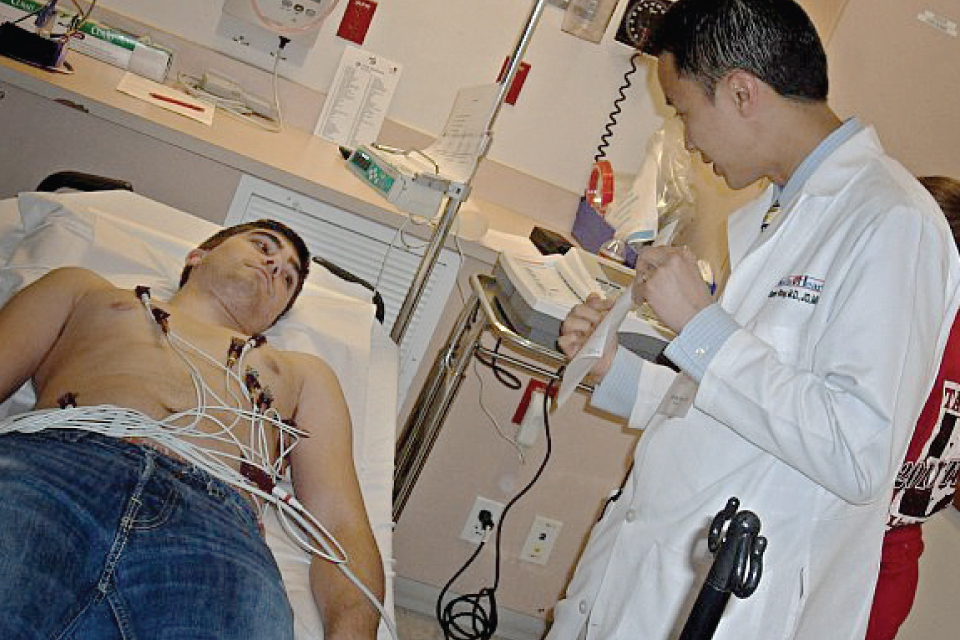Protecting Heart Health For All Ages and Genders

The heartbreaking story and viral YouTube video of Westlake High School student Ben Breedlove’s death from a heart disorder has touched millions.
Cardiac events can happen at any age and heart disease is an indiscriminate attacker. But there are ways to manage heart health—even for students.
Much of what the Heart Hospital of Austin does is preventative. For adolescents, there are free heart screenings for student athletes between the ages of 14-18. The screenings include an electrocardiogram (EKG) and echocardiogram (an ultrasound of the heart) which can expose hypertrophic cardiomyopathy (HCM). This is a genetic condition that causes the heart muscle to thicken. According to Dr. Stanley Wang, clinical cardiologist and director of the Sleep Disorders Center at Heart Hospital of Austin, “HCM is the leading cause of sudden cardiac death in young athletes and affects one in 500 student athletes every year. [HCM] does not usually have warning signs and can be life-threatening if it is not diagnosed.” The Heart Hospital will conduct two free screenings in 2012 for student athletes: Saturday, February 18, from 8 a.m. to noon, and Saturday, August 4, from 8 a.m. to noon.
Part of the St. David’s Medical Center, the Heart Hospital is a leading cardiac program with a 24-7 emergency department.
“There is a wide range of patient types at Heart Hospital of Austin,” said Dr. Wang. “We treat patients of all types with conditions ranging from bumps and bruises to heart attacks.” He pointed out that “heart disease and heart rhythm disorders do not discriminate based on age or certain demographics—they can impact most any person.”
Another diagnostic tool aimed at prevention is the HeartSaver CT scan. This test can show whether there is calcified plaque present in heart arteries. With this knowledge, people can “detect heart disease in its earliest and most treatable stages—long before you experience any symptoms,” explained Dr. Wang. The screening, which takes only moments, is available Monday through Saturday by appointment.
The Executive Wellness program is another proactive step. Aimed at executives or VIPs, it combines an entire week’s worth of medical exams into one day. Dr. Wang elaborated, “The day begins with a doctor’s consultation to discuss the participant’s medical history, followed by a physical exam and a series of screenings to gather detailed information about his or her state of health. The Executive Wellness evaluation extends beyond the typical physical exam and includes screenings such as an exercise stress test, carotid and abdominal ultrasound, pulmonary function test and cardiac CT scan.”
Some factors in heart health are out of a patient’s control: age, menopause, family history, and race (African Americans, Mexican Americans, American Indians, Hawaiians, and Asian Americans are at a higher risk). But Dr. Wang pointed out that there are many other factors leading to poor heart health that are within a patient’s control including being overweight, poor nutrition, low physical activity, smoking, high blood pressure, diabetes, high LDL, or “bad,” cholesterol, low HDL, or “good,” cholesterol, stress, poor dental hygiene, and untreated sleep disorders.
Overall fitness is critical in preventing heart disease. “You should aim for at least 30 minutes to one hour of moderate exercise per day, including walking, cycling, jogging and swimming,” Dr. Wang said. “There is growing evidence that even small tweaks to your routine can improve your cardiac health. A 2011 study revealed brisk walking (a few times a week) improved blood flow by as much as 15 percent.
“Heart disease is the leading cause of death in the United States,” said Dr. Wang, and the rise of obesity in American has certainly been a contributing factor. Research studies involving new medications, medical devices, and leading-edge therapies (including adult stem cell therapies) occur at Heart Hospital of Austin. Recognition of the role sleep disorders play in the development of heart disease has prompted the development of Heart Hospital of Austin’s Sleep Disorders Center.”
Piece 2
While breast cancer has its own color, month, and dedicated events, it is cardiovascular disease that kills almost one woman every minute each year. One in three women is living with with some form of heart disease, and it kills more women than men.
Seton Hospital is participating in a pilot program sponsored by Abbott Labs that’s using a new approach for collecting data on cardiovascular risk factors—surveying women through community obstetricians and gynecologists.
“We are reaching out to gynecologists and obstetricians to make screening for heart disease a part of women’s regular exams,” explained Dr. Caitlin Giesler, Seton Heart Institute cardiologist.
Cardiologists at Seton provide participating doctors with a survey; the patients fill out the survey, and results will be used to initiate further research about heart disease in women. Women who are identified as being “at risk” will then be referred to a physician who specializes in heart care.
“Heart disease is still widely underdiagnosed and undertreated in women. With the right information, we can equip patients to take action to help reverse heart disease and reduce women’s risk of having a heart attack or other cardiovascular conditions later in life,” said Dr. Giesler.
Dr. Giesler stressed that all women should “know their numbers.” For information about these numbers and other heart-healthy information, visit Dr. Giesler’s blog atwww.setonheart.com/women






